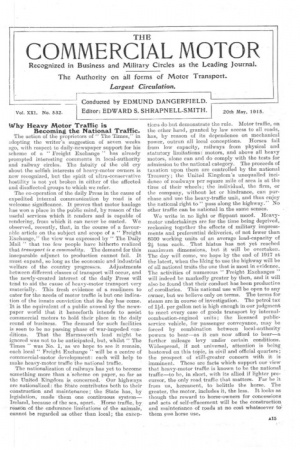Why Heavy Motor Traffic is Becoming the National Traffic.
Page 1

If you've noticed an error in this article please click here to report it so we can fix it.
The action of the proprietors of " The Times," in adopting the writer's suggestion of seven weeks ego, with respect to daily-newspaper support for his scheme of a " Freight Exchange " has already prompted interesting comments in local-authority and railway circles, The fatuity of the old cry about the selfish interests of heavy-motor owners is now recognized, but. the spirit of ultra-conservative hostility is not yet broken in either of the affected and disaffected groups to which we refer.
The co-operation of the daily Press in the cause of expedited internal communication by road is of welcome significance. It proves that motor haulage has. won a place in the public mind, by reason of the useful services which it renders and is capable of rendering, from which it can never be ousted. We observed, recently, that, in the course of a favoureble article on the subject and scope of a " Freight Exchange," the view was expressed by" The Daily Mail " that too few people have hitherto realized that transport is a commodity. The demand for this inseparable adjunct to production cannot fail. It must expand, so long as the economic and industrial welfare of the country progresses. Adjustments between different classes of transport will occur, and the newly-created interest of the daily Press will tend to aid the cause of heavy-motor transport very materially. This fresh evidence of a readiness to cater for the needs of motor traffic is but one indication of the innate conviction that its day has come. It is the equivalent of a public avowal by the newspaper world that it henceforth intends to assist commercial motors to hold their place in the daily round of business. The demand for such facilities is seen to be no passing phase of war-impeded conditions. That the Harmsworth lead might he ignored was not to be anticipated, but, whilst" The Times " was No. I, as we hope to see it remain, each local " Freight Exchange " will be a 'centre of commercial-motor development: each will help to make heavy-motor trafficthe national traffic.
The nationalization of railways has yet to become something more than a 'scheme on paper, so far as the United Kingdom is concerned. Our highways are nationalized: the State contributes both to their construction and Maintenance; the State has,. by legislation, made them one continuous, system— Ireland, because of the sea, apart. . Horse traffic, by reasan,a the. endurance limitations of the animals, cannot be regarded as other than local; the excep tions do but demonstrate the rule. Motor traffic, oa. the other hand, granted by law access to all roads, has, by reason of its dependence on mechanical power, outrun all local conceptions. Horses fail from low capacity, railways from physical and statutory limitations motors, and above all heavy motors, alone can and do comply with the tests for admission to the national category. The proceeds of taxation upon them are controlled by the national Treasury; the United Kingdom's unequalled incidence of roadways per square mile of area is at the tires of their wheels; the individual, the firm, or the company, without let or hindrance, can purchase and use. the heavy-traffic unit, and thus enjoy the national right to" pass along the highway." No other traffic can be national in the same senses.
We write, in no light or flippant mood. Heavymotor undertakings are for the time being deprived, reckoning together the effects of military impressments and preferential deliveries, of not fewer than 8500 working units of an average load-capacity of 21.7 tons each. . That hiatus has not yet reached maximum dimensions, but it will be overtaken. The day will come, we hope by the end of 1917 at the latest, when the liking to use the highway will be of all national traits the one that is most in evidence. The activities of numerous " Freight Exchanges " will indeed be markedly greater by then, and it will also be found that their conduct has been productive of corollaries. This national use will be open to any owner, but we believe only on terms. The terms for steam are in course of investigation. The petrol tax of 10. per gallon net is high enough in our judgment to meet every case of goods transport by internalcombustion-engined units ; the licensed public.service vehicle, for passenger conveyance, may be forced by combination between local-authority powers to bear—as it. can now afford to bear—a further mileage levy under certain conditions. Widespread, . if not universal, attention is being. bestowed on this tOpie, in civil and official quarters; the prospect of still-greater concern with it is imminent. These are facts which support our view that heavy-motor traffic is known to be the national . traffic—to be, in short, with its allied if lighter precursor, the only road. traffic that matters. Far be it from us, hereanent, to belittle the horse, The greater, the motor, includes it, the less. It looks as though the reward to horse-owners for concessions and acts of self-effacement will be the construction and maintenance of roads at no cost whatsoever to them qua horse use.






















